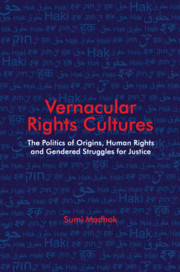 Vernacular Rights Cultures
Vernacular Rights Cultures Book contents
- Frontmatter
- Dedication
- Contents
- Acknowledgements
- 1 An Introduction: Vernacular Rights Cultures and Decolonising Human Rights
- 2 Refusing the Politics of Origins
- 3 Assembling a Feminist Historical Ontology of Haq
- 4 The Political Imaginaries of Haq: ‘Citizenship’ and ‘Truth’
- 5 Resisting Developmentalism and the Military: Haq as a Cosmological Idea and an Islamic Ideal
- 6 Conceptual Diversity, Feminist Historical Ontology and a Critical Reflexive Politics of Location
- References
- Index
3 - Assembling a Feminist Historical Ontology of Haq
Published online by Cambridge University Press: 31 July 2021
- Frontmatter
- Dedication
- Contents
- Acknowledgements
- 1 An Introduction: Vernacular Rights Cultures and Decolonising Human Rights
- 2 Refusing the Politics of Origins
- 3 Assembling a Feminist Historical Ontology of Haq
- 4 The Political Imaginaries of Haq: ‘Citizenship’ and ‘Truth’
- 5 Resisting Developmentalism and the Military: Haq as a Cosmological Idea and an Islamic Ideal
- 6 Conceptual Diversity, Feminist Historical Ontology and a Critical Reflexive Politics of Location
- References
- Index
Summary
How to study vernacular rights cultures? How to do conceptual work on human rights from the Global South? In this chapter, I assemble a feminist historical ontology as a potentially enabling methodological apparatus for documenting the stakes and struggles over rights and human rights in ‘most of the world’. Driving my methodological investment in a feminist historical ontology of haq is a bid to take seriously a two-fold refrain that often accompanies progressive human rights talk: first, an empirical plea for a need to study human rights in different contexts, and second, a theoretical plea for a more sustained study of the normative meanings and practices of rights in different parts of the world. These are important goals, however, they shed little light on how to go about engaging in this work. In other words, how to actually do this work of documenting the normative meanings of human rights in different contexts? And how to conceptually capture the productivity, ideational energy of rights and human rights in different locations? Finally, how do normative meanings and practices of rights in different parts of the globe disrupt or facilitate epistemic encounters with human rights scholarship and politics in ‘most of the world’? The questions I set out to answer in this chapter are: how to study conceptual, normative meanings as well as empirical practices and politics of human rights in ‘most of the world’, and further, how do these interact and speak back to the epistemic, political and normative drives and assumptions of global human rights discourses?
My contention here is that a feminist historical ontology might enable us to engage with these questions. Quite simply, a feminist historical ontology brings together the critical insights of historical ontology with those of feminist critical reflexive politics of location. In this chapter I will assemble key elements of a feminist historical ontology and lay out the theoretical and conceptual mechanics of the methodological investigations of haq that drive the work of this book. In what follows, I will first offer an outline of a feminist historical ontology of haq. My aim is to show how a feminist historical sontology informs a particular reading of haq. In assembling key elements of a feminist historical ontology in this chapter, my aim is not to enter into an exegesis of ontology or indeed of the ‘ontological turn’.
- Type
- Chapter
- Information
- Vernacular Rights CulturesThe Politics of Origins, Human Rights, and Gendered Struggles for Justice, pp. 71 - 98Publisher: Cambridge University PressPrint publication year: 2021


